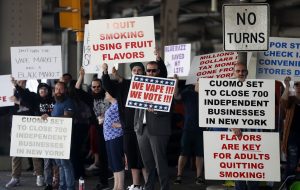 According to reports, the White House has backed off from its pledge to ban the flavored vape products that have done so much to attract the young, to the point where officials now describe youth vaping as an epidemic. The reason for the flip-flop: Trump’s campaign manager thinks it could cost the President too many votes in the upcoming election. And that literally “trumps” other concerns.
According to reports, the White House has backed off from its pledge to ban the flavored vape products that have done so much to attract the young, to the point where officials now describe youth vaping as an epidemic. The reason for the flip-flop: Trump’s campaign manager thinks it could cost the President too many votes in the upcoming election. And that literally “trumps” other concerns.
I can’t say this comes as a surprise.
Trump backs off flavor ban for e-cigarettes
Frankly, I never expected them to make the move in the first place, given that vaping is now a major revenue source for corporate giants such as Altria Group (formerly Philip Morris Companies, makers of Marlboros). Just a year ago, Altria bought a stake in Juul Labs for a cool 12.8 billion dollars. That’s not pocket change, even for them.
JUUL’s enormous financial success was built in large part on its ability to sell its products to people who weren’t heavy smokers struggling to quit. These young folks were more interested in looking cool and getting a boost from the stimulant nicotine. Mint, menthol and candy-flavored cartridges were simply a way of making their products more attractive (and less irritating) to the inexperienced user. It was a marriage made in chemistry labs and Corporate board rooms.
Public health experts quickly became concerned. In America, cigarette smoking is at all-time lows, due to a massive educational effort that began all the way back in 1964. The nation gradually came to realize that something had to be done about smoking and its numerous health consequences. Over the vigorous objections of the tobacco industry, it was.
Now all that progress is threatened by electronic smoking. And that could be a convenient door into tobacco use. As one young vaper explained, since he’s already hooked on nicotine, why not have a cigarette from time to time? If things get out of hand, he can always go back to the vape pen.
Famous last words.
When society has permitted something like this to grow into a major revenue stream for Big Business, we must expect the CEOs and CFOs to fight hard against later attempts to exert control — fearful, naturally, that it will cut into precious revenue. That’s what happened with Big Tobacco. Corporations will fight dirty to protect their investment. And when politics and public health clash, politics usually prevails.
Perhaps after the next election — provided things settle down (he says, hopefully) — the Federal Government and Congress can return to the issue with a more positive approach. I suspect that public support for restrictions on vaping will still be there, and perhaps stronger than before.









